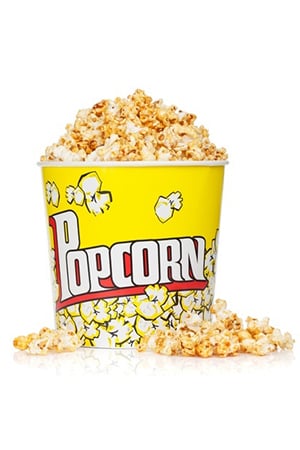 American food culture has traditionally been overloaded with "junk" and comfort foods. But now that the market is increasingly shifting toward fast, fresh and healthy, how are snack foods doing?
American food culture has traditionally been overloaded with "junk" and comfort foods. But now that the market is increasingly shifting toward fast, fresh and healthy, how are snack foods doing?
Turns out, pretty well.
Millennial consumers' demand for healthy foods seems to be somewhat muted by an ongoing addiction to junk food that is enabled by their tendency to forego traditional meals and instead rely on snacks to get them through the day. Ready to eat (RTE) junk foods— jerky, popcorn, chips, candy and the like— that one formally would have found relegated to the aisles at the local pony keg or convenience store are increasingly popping up in high-end, "natural" grocers like Whole Foods.
How Microwave Popcorn Died and Was Reborn RTE
As little as three years ago, microwave popcorn sales exceeded those of RTE popcorn snacks by roughly double. But in the intervening time, microwave popcorn sales stagnated, while those of RTE steadily rose. In 2014, the two lines were almost even, and RTE popcorn sales are projected to overtake those of microwave-style this year. Why?
Simple. For short-attention-spanned Millennials, two minutes of cooking time is too much to wait when an RTE option is available. And, in addition to convenience, RTE popcorn makers are beating microwave popcorn producers in another area, too— taste variety.
Although microwave popcorn lines have shown some variation over the past few years, branching away from the traditional butter-and-salt and into kettle corn, cheddar and even ranch-flavored territory, they still pale, in Millennials' eyes, to RTE popcorn lines that include exotic "artisanal" flavor profiles like "Maple Sea Salt," not to mention sideline, related products like "Sweet Barbeque" puffs made with "ancient grains."
In short, junk food makers learned how to be just as epicurean as the gourmand entree producers that "foodie" Millennials worship on Twitter, Yelp and Facebook. They tapped into the zeitgeist.
Adventurous Snack Food Flavors Sell, Plain and Simple
The more complex or exotic it sounds, the more likely taste-exploring Millennials are to try it. But will they continue to buy the same flavor over and over again? Probably not.
That leaves food producers two options:
- Try to limit product runs to increase scarcity and drive up the profit margin
- Continually develop, roll and then mothball new flavors
The first option comes with the risk of pricing yourself out of the market; the second will have your food science lab personnel in a never-ending, tail-chasing flavor tizzy. Neither seems advantageous.
So is there a third option? Maybe. Brand loyalty.
But Millennial consumers, with few exceptions, aren't known for finding a brand and sticking with it. In the Millennial-ruled world, for every Facebook you find, you'll find a bevy of Friendsters, Myspaces and Ellos. As cuisine goes, for every successful food truck, you'll find a slew of failed ventures for sale on Craigslist. For every Starbucks-like success story, you're going to find a closed Caribou Coffee, Peaberry, or Tazza Mia location. And for every Chipotle outlet, you're going to find two or three knockoff fast-and-fresh Mexican chains on which the jury remains out.
American food culture is littered with bandwagon jumpers who couldn't establish brand loyalty. But in an era when the next taste, the next "super ingredient," or the next hybrid, snackified product is what most customers are on constant alert for, is the flavor variety/innovation model sustainable? Or will we reach a point at which offerings are so diversified that diversity in and of itself has become homogenous?
Can junk food purveyors keep up with the artisanal trend? We'll see how many can remain standing. In the meantime, there's plenty of room in the market to get wild.







